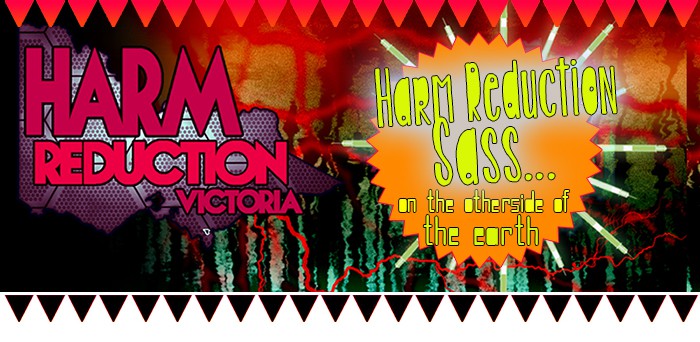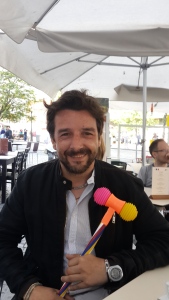Attending Club Health Lisbon 2015 provided me with the perfect opportunity to meet with members of CASO, Portugal’s drug user organisation (DUO). Much to my embarrassment, after arranging a meeting, which I assumed would take place in Portugal’s capital, Lisbon, I quickly learned that CASO and the incandescent activist spirit that gave momentum to the country’s decriminalisation reform at the turn of the millennium, was actually centered in Porto. I was able to reschedule the meeting, no problem. Getting to Porto was pretty straight forward (and flying there with Ryanair was like taking a poignant refresher course in the importance of self-assertion). However, I was arriving in Porto on 23 June; I was completely under-prepared for Festa de São João do Porto, but it was a case of serendipitous timing…I was privileged to witness the kind of passion that is required in order to reform draconian drug laws!
Where to start? There’s so much to write on Porto, CASO, and the non-governmental development organisation, Apdes, that empowered the drug user org into existence. ‘You had to have been there‘ is a bit too patronising and while I really do encourage you to see Porto, especially on the day the city celebrates a mix of sacred and profane traditions in the name of St John, I will limit this post so it’s an introduction to CASO, with reference to Apdes, and catalogue the DUO’s agenda ‘Wish List’.
First, I met with CASO Chairman, Sérgio Rodrigues. CASO is an acronym for Consumidores Associados Sobrevivem Organizados, which translates (roughly) to Consumers Associated Survive Organised. CASO was established in 2007 after Apdes facilitated a meeting between local drug users and Theo Van Dam (no relation to Jean Claude and more kick-ass). Theo is a key player in the global drug user activist movement which started in Holland in the mid-1970s; he spoke of the increased drug user rights activism efficacy that could be achieved if a DUO were established. When Theo visited Porto in 2007, Sérgio was a local peer educator performing outreach for one of Apdes’s harm reduction projects, GIRU (Group Intervention on the Rua or street).
Sérgio spoke highly of the encounter, which commanded my respect. Here’s my musings on what I’ve interpreted as Apdes and Theo’s ‘call to arms’: when your government (even relatively progressive ones) and international bodies of authority reinforce the idea that ‘you’re a bad person because you use drugs’ and those (the the majority of people) who are only affected to the extent that they have to publicly censor themselves every now-and-then, find it easier to just accept the status quo that’s been entrenched by moralistic, pro-abstinence fanatics.
It’s quite radical and liberating to be told that you should be proud of yourself and you deserve to have your health rights and human rights respected, and that peer education is real work that should earn pay. To be told that educated well-dressed people can be and frequently are, wrong or weak-willed and choose wait for the impetus of the populace, before showing any political courage. What I’m writing about is stigma and discrimination; a stealth and pervasive assassin. Even though CASO originated in 2007, which was 6 years after decriminalisation was enacted in Portugal, there was still an integral role for drug user activists to play and Apdes provide a fertile landscape for CASO to flourish.
When I met with Apdes’ Executive Director, José Queiroz, I assumed our conversation was going to concentrate on practical harm reduction measures (practiced and proposed) in Porto specifically and then discuss Portugal more broadly and largely, that’s what we did. What I wasn’t expecting was to have a warm and welcomed reminder of just how important it truly is to approach my work (and life) with a conceptual awareness of community development as a pragmatic, but also philosophical process. A lot of the time I want to approach issues guns blazing, because the injustice and the solution is so glaring obvious (for example, NSPs in prisons, and insert here xyz examples of other basic health interventions that will save individual lives and benefit the community as a whole!) And I’m often skeptical when someone says ‘we don’t want to rush into things, we have to do this properly’ it’s a tactic used to make them sound calm and reasonable, when really they’re buying time, waiting for the pendulum’s impetus to swing back the other way and allow bigotry to reign for another day (like what Abbott’s doing right now with gay marriage in Australia, shame…shame). But José wasn’t stressing the importance of unnecessarily risk adverse ‘bureaucratic process’, but Process; processes that empower an affected community/a key population, so that outcomes are positive, collaborative, and sustainable. Teach a [hu]man to fish, kind-of-style, but he managed to do so without sounding rhetorical.
From 2007, Apdes empowered the founding members of CASO in the form of funding and training and in 2011 CASO was formalised. Sérgio shared examples of the DUO’s subsequent key advocacy successes; including a petition signing which prevented the closure of CAT/ET Gaia, a treatment centre; and the staging of a two day protest over World AIDS day in December 2011 outside the Russian Consulate in Porto. CASO is in the midst of various campaign partnerships across Europe too. While CASO operates from within the Apdes office space, it’s members also meet each Tuesday morning at Biscuit cafe in Balatha Plac, the DUO independently navigates its own agenda, and both organisations consider CASO’s autonomous operation integral to their respective objectives.
Sérgio Rodrigues

CASO’s Agenda ‘Wish List’:
1) Consumption rooms i.e. safe smoking and injecting spaces. The decriminalisation reform included provisions for consumption rooms, but the dissonance between policy and practice has meant they haven’t been implemented in Portugal. José speculates this may be the combined result of the Mayors of Portugal’s two main cities lacking the political courage necessary to push on the issue against overt moralistic naysayers and NGOs lacking the self-confidence and knowledge of such services. Anti-stigma/discrimination education and consciousness-raising could do a lot to shape how consumption rooms are perceived by the public, because it is an evidence-based service that improves the health and quality of life for people who use drugs.
2) Naloxone is not available in Portugal, which really shocked me. This will happen and, most likely, within two years (just assert it with confidence, you’re backed by reason and common sense, she tells herself). Why hasn’t it been rolled out? There’s no significant politicised or moralistic opposition to the life-saving opiate-antagonist being introduced; it’s Dollar $ign$ pretty much, but prevention is better [cheaper] than a cure and easily avoidable overdoses are tragedies (See EMCCDA report on overdoses).
3) Needle & Syringe Programs (NSP) do not exist in Portuguese prisons. Like with consumption rooms, Portugal’s 2001 drug policy reform included a proviso for NSPs in prisons. But the implementation of NSPs in custodial settings has been used as leverage by prison unions protesting for higher pay rates for prison staff. It’s argued their role involves higher risk if the service exists. There is also opposition from non-injecting inmates. José commented that the ‘official’ and dominant argument that is proliferated is that ‘there is no drug use in prisons’ and to introduce NSPs would be tantamount to an admission. With the Vanguarda project, Apdes is allowed to perform harm reduction education though safer injecting etc. Education may be more palatable and still life-saving, but subject to impotence in the absence of practical tools (i.e. it’s safer to inject when you’re using sterile equipment)! José suggested a civil society NGO could be successful in gaining ground on this issue by conducting research on HCV incidences in prisons and using the findings to pressurise for reform.
4) Cannabis legalisation. This is an issue that has momentum independent of CASO or Apdes, but from a DUO perspective it is an engaging, non-gender specific issue that appeals to a broad age demographic (and I bet it’s nice to be in line with the mainstream on some points, no one wants to feel marginalised and ostracised while facing an uphill battle, just to stay alive or retain your autonomy).
5) Prescription heroin. At present this is not available in Portugal, but a mixed model approach to OST is better able to accommodate for the multi-faceted pharmacotherapy needs of people who use drugs; so this is something CASO advocates for.
6) Subutex (buprenorphine) is available, but not free like methadone. Like prescription heroin, more pharmacotherapy options means the complex needs of peers are able to be better met. Apdes has conducted a study on the OST preferences of people who use drugs and a finding is, doctors don’t or only rarely ask consumers what they want. This highlights a potential role for peer educators to empower their peers with a better understanding of the range of pharmacotherapy options available to them. Further, harm reductionists could provide training for prescribers, so they felt more confident offering a diversified range of OST. At present the Portuguese government has a monopoly over methadone, which limits the incentive for expanding the OST options available.
7) Peer educators serve a highly valuable function and CASO wants this to be better recognised as a professional service. The tension between the respective and complimentary roles of peer educators and harm reductionists highlights the hierarchical nature of healthcare. Apdes has conducted research that concluded the integration of the peer education model is critical in order to ensure harm reduction outreach is as effective as possible. (See InPar).
While many countries around the globe can look to Portugal’s reformed drug policy model as a positive progression towards the promotion of the health rights and human rights of people who use drugs, echoing the philosophical reflections above, it is an ongoing process. Peer-led advocacy is, and always will be, essential in order to avoid regression and further refine the empowerment of this key population.


